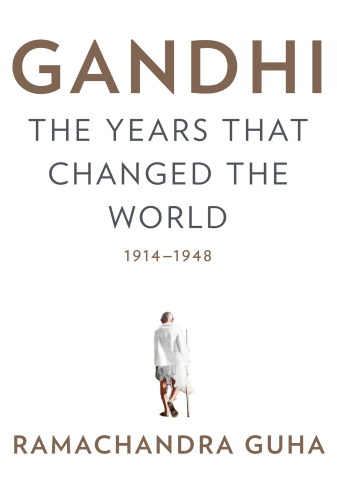
Gandhi
The Years That Changed the World, 1914-1948
کتاب های مرتبط
- اطلاعات
- نقد و بررسی
- دیدگاه کاربران
نقد و بررسی

April 15, 2018
Gandhi Before India, the first volume in Guha's massive biography of Mohandas Gandhi, was a 2014 New York Times Notable Book. Here's the second and concluding volume, which opens when Gandhi arrives in Bombay in January 1915 and, as the subtitle indicates, sweeps through the earthshaking nonviolent revolution he set off that changed not just India but the world.
Copyright 2018 Library Journal, LLC Used with permission.

Starred review from August 20, 2018
In the second half of his two-part biography of Gandhi, Guha (Gandhi Before India) mines newly discovered archival material to produce a portrait of the Indian leader that is both panoramic in scope and surprisingly intimate, both admiring of Gandhi and cognizant of his flaws. On his return from South Africa in 1915, Gandhi was a much-admired but little-known figure outside of his own Gujarati community and India’s urban elite. In the next three decades, he mobilized national support for Indian self-rule, traveling the length and breadth of the subcontinent preaching his philosophy of satyagraha, or nonviolent resistance. Along the way, as Guha details through exhaustively pieced-together correspondence, Gandhi’s beliefs evolved: his intellectual sparring with B.R. Ambedkar, the leader of India’s “untouchables,” led him to soften his more conservative stance on caste, and his relationship with his long-suffering wife, Kasturba, grew to resemble an equal partnership in its later years. Guha contextualizes Gandhi’s anticolonialism as merely one strand in a rich skein of political and moral beliefs, arguing that Gandhi’s campaigns for Hindu-Muslim unity, the abolition of untouchability, and the promotion of moral self-discipline (or swaraj) were inseparable from his goal of ending British rule in India. Incisively written, this is a landmark account of Gandhi’s engagement with the world he would transform forever.

September 1, 2018
Following Gandhi Before India (2014), noted political historian Guha continues with a massive and much-needed study of his subject's emergence as a world leader.Gandhi (1869-1948) arrived in India, after living in South Africa, in 1915 and immediately began to agitate for independence, renouncing what he called "violence and anarchy" and building an ashram-based movement of satyagraha, or nonviolent resistance to oppression. His earliest years in India were occupied with forging political alliances, building the case for independence with Annie Besant, Muhammad Ali Jinnah, and other like-minded (but quite divergent) activists. As Guha writes, though profoundly influential and now sainted, Gandhi was human, with all the freight that carries. He may have renounced sex in his 30s, but he experimented with temptation late in life; he may have wished he'd been celibate before siring difficult heirs, only one of whom, he said, "had been born to compensate me for the dissatisfaction I feel from my other three sons." The author portrays Gandhi as a masterful politician intent on a number of reforms apart from independence, including the dismantling of caste and religious barriers and advancement of gender equality. In his political dealings, he confronted numerous obstacles, including fellow Indians who wished to press for an established religion and the thorny question of whether to support the Allies in their war against the fascist powers in World War II, which afforded Jawaharlal Nehru and other leaders a lever by which to insist that Britain relinquish empire in order to battle for democracy. If some of Gandhi's ideas seem old-fashioned today--e.g., his insistence on the village and agrarian pursuits as the bases for a free nation--then many of them are resolutely forward-looking, as when he told a visiting delegation of African-Americans, "it may be through the Negroes that the unadulterated message of non-violence will be delivered to the world."Superb. On nearly every page, Guha offers evidence why Gandhi remains relevant in the world 70 years after his death.
COPYRIGHT(2018) Kirkus Reviews, ALL RIGHTS RESERVED.

























دیدگاه کاربران